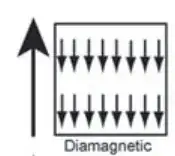I've visited multiple resources and read a lot of questions here on the nature of diamagnetism. I still don't understand if it truly has anything to do with lenz's law. In Walter Lewin's electromagnetism lectures, he says that this is wrong. It has nothing to do with lenz's law and cannot be understood without quantum mechanics. This is because the applied field is permanent so there's no change in field strength or flux, at least after the field has gone from zero to maximum. This makes sense, but it still doesn't explain the phenomenon. Some books, like Notling's Quantum theory of magnetism and Feynman's lectures do say that lenz's law does have something to do with it. Multiple answers here too say the same thing. Yet Nolting's book affirms that there can be no classical theory that fully explains magnetism. Isn't Lenz's law a classical rule? An answer here to a previous question of mine does say that thinking of electrons as orbiting the nucleus in circular orbits is very outdated and strictly not true. I agree, but still don't understand. So my questions are
- If the field is indeed permanent, how does lenz's law operate here?
- If we have a single electron in a single atom, not a molecule, the same effect should happen. The applied field, if it is changing, should induce currents that produce fields opposite to the direction of the applied field. This would make the magnetization negative. How, then, do we observe paramagnetism?
- I've read in griffith's electrodynamics and also in Feynman's lectures that the field changes the speed of electrons, hence changing the orbital angular momentum and orbital magnetic moment such that the change in magnetic moment is opposite in direction to the field. Magnetic forces do no work, but a changing magnetic field induces an electric field which exerts forces on the electrons. But this, again, assumes a changing field. This does not need to be the case. So how are these effects explained in the case of a permanent field?
